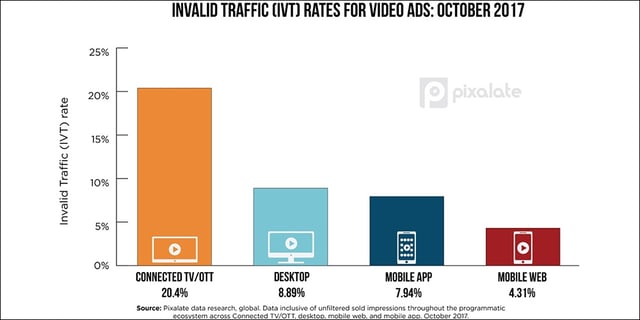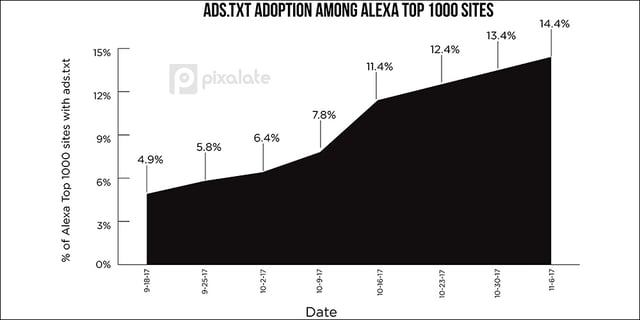


This week's review of ad fraud and quality in the digital advertising space.

New research from Pixalate reveals that over 20% of programmatic Connected TV/OTT impressions were invalid in October 2017. "Of these invalid impressions, the vast majority (96.3%) were Sophisticated Invalid Traffic (SIVT)," the blog reads. Learn more about OTT video ad fraud — and how it stacks up against desktop, mobile web, and mobile app.

"Pixalate has partnered with LKQD to include Pixalate’s pre-bid invalid traffic (IVT) detection and filtration technology into LKQD’s platform," a Pixalate blog post this week revealed. The partnership enables LKQD users to block IVT at the supply source, based on demand tag, based on environment, and more.

eMarketer has reported, citing research from InMobi, that "in Europe, nearly three-quarters of app marketers polled in July 2017 believe ad fraud presents a serious problem to their operations." The article added: "The survey found that ad fraud was the second most widespread concern that app marketers have to deal with, behind only attribution. But only 44% of app marketers in Europe said they had a strong understanding of ad fraud and its potential impact on campaigns."

"Google is rolling out new security features for Chrome which will make it harder for third-party ads to subvert pop-up blockers or disguise links within a site," wrote The Next Web. "This could be part of Google’s campaign against malicious ads, which it’s been working on since earlier this year," the article added. "The company has also said advertisers have until next year to clean up their ads or they won’t appear to Chrome users at all." Per The Next Web, these redirects will start being blocked in January 2018.

In a press release on Thursday, The Trade Desk announced that it "will begin implementing the Interactive Advertising Bureau’s (IAB) ads.txt initiative starting November 15." The press release adds: "On that date, The Trade Desk will begin blocking unauthorized impressions, or impressions served through non-certified suppliers, from publisher sites that have tested, verified and finalized their ads.txt files." Download the full list of publishers with ads.txt implemented.
Sign up for our blog to stay updated with new stats, trends, and analysis on digital ad fraud.
*By entering your email address and clicking Subscribe, you are agreeing to our Terms of Use and Privacy Policy.
These Stories on Weekly Recaps
*By entering your email address and clicking Subscribe, you are agreeing to our Terms of Use and Privacy Policy.

Disclaimer: The content of this page reflects Pixalate’s opinions with respect to the factors that Pixalate believes can be useful to the digital media industry. Any proprietary data shared is grounded in Pixalate’s proprietary technology and analytics, which Pixalate is continuously evaluating and updating. Any references to outside sources should not be construed as endorsements. Pixalate’s opinions are just that - opinion, not facts or guarantees.
Per the MRC, “'Fraud' is not intended to represent fraud as defined in various laws, statutes and ordinances or as conventionally used in U.S. Court or other legal proceedings, but rather a custom definition strictly for advertising measurement purposes. Also per the MRC, “‘Invalid Traffic’ is defined generally as traffic that does not meet certain ad serving quality or completeness criteria, or otherwise does not represent legitimate ad traffic that should be included in measurement counts. Among the reasons why ad traffic may be deemed invalid is it is a result of non-human traffic (spiders, bots, etc.), or activity designed to produce fraudulent traffic.”



